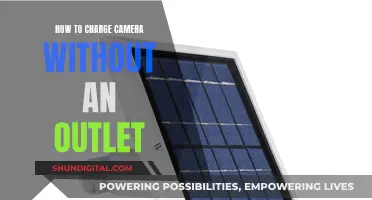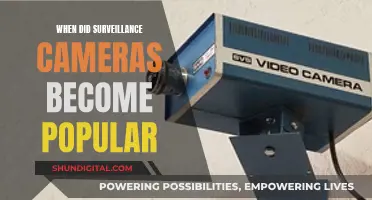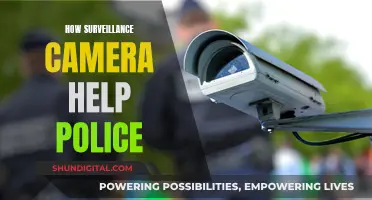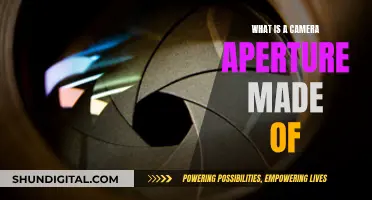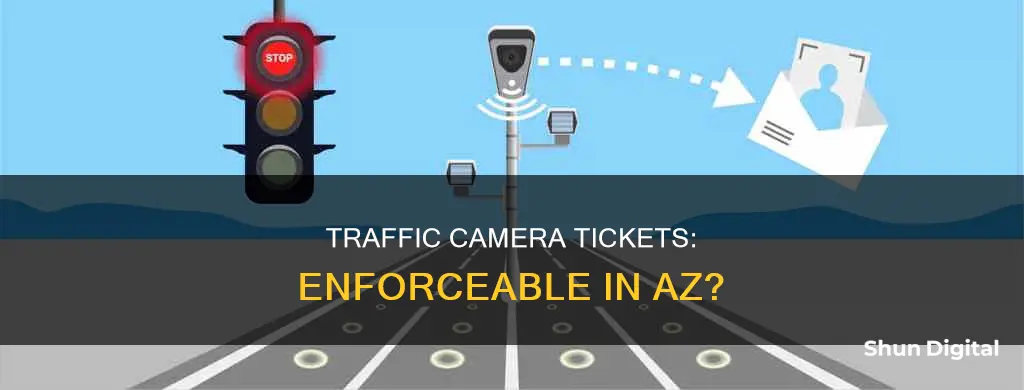
Arizona's photo radar tickets are enforceable, but there are ways to fight them. Speed cameras are legal in Arizona, and the state allows each city or town to run its own photo enforcement program. Tickets are generated by a network of traffic cameras that take photos of vehicles under certain conditions, such as when their sensors detect motion during a red light or speeding. While some people insist that you can ignore these tickets, this is not true. If you receive a photo radar ticket, you have the option to pay the fine or fight it in traffic court. Ignoring a ticket can result in a license suspension and further penalties.
| Characteristics | Values |
|---|---|
| Are AZ traffic camera tickets enforceable? | Yes, photo radar tickets are enforceable in Arizona. |
| What are photo radar tickets? | Also known as the Red Light Camera Enforcement Program, photo radar tickets are generated by a network of traffic cameras that take photos of vehicles under certain conditions. |
| When are photo radar tickets issued? | When sensors detect motion during a red light or sense anything over the speed limit. |
| Who operates the photo enforcement systems? | Arizona law allows cities to operate photo enforcement systems. Cities use two companies primarily, RedFlex and American Traffic Solutions. |
| How are photo radar tickets served? | A ticket is formally "served" when a process server physically comes to your house or place of residence and serves you, or someone of a suitable age (14 or older). |
| What happens if you ignore a photo radar ticket? | Failure to respond to a served violation can result in a license suspension and further penalties such as jail time and fines. |
| What are the penalties for photo radar violations? | Photo radar violations are civil traffic offenses, typically resulting in fines and points against your license. Accumulation of too many points can lead to a license suspension. |
| What are your options when receiving a photo radar ticket? | You can choose to pay the fine and attend Defensive Driving School to keep points off your license, or you can hire a lawyer to fight the ticket, especially if you have multiple tickets or are at risk of losing your license. |
What You'll Learn

Photo radar tickets are enforceable in Arizona
Photo radar tickets are generated by a network of traffic cameras that take photos of vehicles under certain conditions. They will snap a photo if their sensors detect motion during a red light or if they sense anything over the speed limit. The purpose of these cameras is to help reduce the number of urban accidents, and studies have shown that this initiative has been successful.
If you receive a photo radar ticket, it is important to know your rights and understand the process. According to Arizona law, the county has 60 days from the violation date to file the citation with the courts. After the filing date, they have an additional 90 days to serve you with the citation.
You may have heard that you can ignore photo radar tickets, but this is not true. While it is true that you do not need to respond to a mailed citation, if you are served with the ticket, you are responsible for paying the fine. Failure to respond to a served violation can result in a license suspension, which can cause further legal troubles, including jail time and hefty fines.
If you believe you have been cited unjustly, you have the option to fight the ticket in traffic court. However, it is important to consider the costs of doing so, as they may outweigh the benefits. If you have multiple violations or are at risk of losing your license, it may be a good idea to seek legal representation.
Are Camera Batteries Charged? Understanding Camera Battery Basics
You may want to see also

You don't need to respond to a mailed photo radar ticket
Arizona's photo radar tickets are enforceable, but you may not need to respond to a mailed photo radar ticket.
Firstly, it's important to distinguish between a "Notice of Violation" and an official "Traffic Ticket and Complaint". A Notice of Violation is not a ticket, and you are not legally obliged to respond to it. This is because the police cannot identify the driver, and so the notice is sent to the registered owner of the vehicle. As the city only has 60 days from the violation date to issue a ticket, if you don't name the driver, a ticket will likely not be issued.
On the other hand, a Traffic Ticket and Complaint is an official ticket and will be multiple pages long. This means there is a court case involving the named driver. The ticket will include coupons with various options to mail back to the court. However, it is recommended that you do not mail anything back until you have spoken to an attorney, as you may unwittingly waive some of your rights.
If you receive a mailed citation from a photo radar camera, it is not an official ticket and does not need to be responded to unless it has been formally served to you. According to Arizona law, the city has 60 days to file your citation with the court before mailing it to you. A filed traffic citation must then be formally served within 90 days of being filed to be granted jurisdiction. This 90-day period begins only after the citation is filed with the court.
Tickets can be served in the following ways:
- Process server: A licensed individual comes to your home and physically hands you, or another person of age, the ticket.
- Alternative service: When courts allow cities to serve a ticket by certified mail, or by taping it to your front door or garage.
If you have received a citation and want to avoid a process server, note the "Date Issued" on the citation and add 90 days. If you haven't been served by this new date, the ticket is no longer valid and will be dismissed.
However, it's important to note that responding to a mailed photo radar citation in certain ways will prove to the court that you received the citation, thus waiving your right to be served. This includes:
- Filling out and returning any paperwork sent with the citation.
- Providing a statement denying that you were the driver.
- Communicating with the court judge.
- Formally requesting a time extension.
In summary, you do not need to respond to a mailed photo radar ticket unless it is served to you. If you do receive a ticket, it's recommended to seek legal advice, especially if you have multiple citations or are at risk of losing your license.
Where Are Dragon Touch Cameras Manufactured?
You may want to see also

If served, you will be responsible for the service fee
Arizona's photo radar tickets are entirely enforceable, and if you are served with a ticket, you will be responsible for the service of process fee, which is typically $40-$100 depending on the jurisdiction. This fee is in addition to the fine for the traffic violation, which can be up to $250 for a red-light violation, and the cost of any resulting increase in your auto insurance premium.
If you receive a photo radar ticket, it is important to understand your rights and responsibilities. Firstly, you should know that simply receiving a notice of a traffic violation in the mail is not the same as being served with a certified court document. Unless the notice comes directly from the court, you are not legally required to identify anyone in the photo or respond to the notice. However, if the photo radar company imposes fees for non-payment by a certain date, these fees can be enforced if the county court files the citation. Therefore, ignoring a photo radar ticket may result in being served with a ticket, which can carry additional consequences.
The county has 60 days from the violation date to file the citation with the courts, and then an additional 90 days to serve you with the citation. The citation must be served by a process server who physically comes to your house or place of residence and serves you or someone of suitable age (14 years or older) residing within your property. The process server should physically hand the document to an individual and take notes regarding the service. However, some jurisdictions allow for alternative service methods, such as getting permission from a judge to mail a copy via certified mail and taping or posting a copy of the citation to your door or garage.
If you are served with a photo radar ticket, you have two main options: pay the ticket or fight it in traffic court. Paying the ticket is an admission of guilt and may result in a bump in your auto insurance premium for around three years. On the other hand, fighting the ticket may incur legal fees, and the cost of hiring an attorney may be more than the ticket itself. Therefore, it is essential to carefully consider your options and the potential consequences before taking any action.
Unleashing Panasonic's Burst Mode: Capturing Action with Precision
You may want to see also

Ignoring a served ticket can result in a license suspension
While you may be tempted to ignore a photo radar ticket, doing so could result in serious consequences, including a license suspension. In Arizona, speed cameras are completely legal, and photo radar tickets are enforceable. If you believe you were cited unjustly, you have the option to fight the ticket in court. However, ignoring a served ticket is not a wise decision.
When you receive a photo radar ticket, it is important to understand the process and your rights. The county has 60 days from the violation date to file the citation with the courts, and then an additional 90 days to serve you with the citation. This means that simply receiving a notice of violation in the mail is not enough for the ticket to be enforceable. The citation must be served to you in person or to someone of "reasonable age" (14 years or older) at your residence.
If you ignore a served ticket, you may face a license suspension. This can have significant impacts on your driving privileges and may even result in additional fines or jail time if you are caught driving with a suspended license. Additionally, ignoring a traffic ticket can also lead to increased insurance premiums or even hinder your eligibility for insurance.
It is important to note that there are alternative service methods that may be used. For example, a court order may allow the process server to get the documents certified and tape them to your door or leave them at your address in plain view. This is known as "alternative service" and is commonly used in certain cities, such as Scottsdale.
If you receive a photo radar ticket, it is advisable to seek legal advice or consult with a traffic offense attorney. They can guide you through the process and help you understand your options, whether that involves paying the ticket, attending defensive driving school, or fighting the ticket in court.
Charging the Fuji X-A10: A Step-by-Step Guide
You may want to see also

You can fight a photo radar ticket in court
Arizona's photo radar tickets are enforceable, and you can't simply ignore them. However, you do have the option to fight a photo radar ticket in court. Here's a detailed guide on how to do that:
Know Your Rights:
When you receive a photo radar ticket in the mail, you don't have to respond to it unless you are formally served with the ticket. According to Arizona law, a citation must be served within 90 days of being filed with the court. A process server will physically come to your house or place of residence and serve you or someone of suitable age (14 or older). Simply mailing the citation is not enough.
Waiving Your Rights:
Be careful not to waive your rights unintentionally. Filling out and returning paperwork, sending a letter, going to court, or writing an angry letter to the judge are all ways you might waive your rights and acknowledge receipt of the ticket. Generally, calling the court or viewing photos/videos online is not considered a waiver.
Hiring an Attorney:
Consider hiring an attorney, especially if you have multiple tickets, are at risk of losing your license, or have a commercial driver's license (CDL). An experienced attorney can guide you through the process and improve your chances of success.
Understanding the Hearing Process:
A civil traffic hearing typically involves the photo radar police officer or traffic aide, the prosecutor, the defense (you or your attorney), and the judge. The government goes first, presenting their evidence, which may include photographs, calibration documents, videos, and traffic patterns. After their presentation, it's your turn to cross-examine and present your own evidence and testimony.
Strategies for Disputing the Ticket:
One strategy is to argue that the government's evidence doesn't show what they claim. For example, you can compare scattergrams of traffic speeds to demonstrate that your speed was reasonable and prudent given the circumstances.
Another strategy is to demonstrate that you weren't the driver. However, simply submitting the form on the ticket indicating you weren't the driver is usually insufficient. You need substantial evidence, such as proof that you were out of state or that another individual was driving.
You can also challenge the reliability of the equipment. An investigation might reveal that the equipment was faulty, poorly maintained, incorrectly calibrated, or lacked scientific reliability, rendering any evidence defective and inadmissible.
Additionally, you can argue that the equipment and process deny your right to question witnesses. Since you receive the ticket days or weeks after the alleged violation, you lose the opportunity to cross-examine adversarial witnesses.
Other potential defenses include lack of signage, incorrect traffic light timing, photo evidence manipulation, and lack of a fair trial.
Weighing the Costs:
Keep in mind that fighting a ticket can be costly, and sometimes the cost of an attorney may exceed the fine itself. However, it's important to also consider the potential impact on your insurance rates and the possibility of a license suspension when making your decision.
In conclusion, while photo radar tickets are enforceable in Arizona, you have the right to dispute them in court. By understanding the process, knowing your rights, and employing effective strategies, you can increase your chances of successfully fighting a photo radar ticket.
Kodak Camera Battery Exhausted: What's the Fix?
You may want to see also


